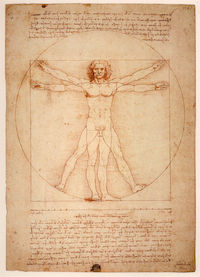 Culture & Ethics
Culture & Ethics
 Evolution
Evolution
 Human Origins
Human Origins
A Historian Asks, "What if Other Human Species Had Survived?"
 The morality of the 21st century will depend on how we respond to a simple but profound question: Does every human life have equal moral value simply and merely because it is human?
The morality of the 21st century will depend on how we respond to a simple but profound question: Does every human life have equal moral value simply and merely because it is human?
Answer yes to that question and it is the end of racism, sexism, "ableism," and the insidious and subversive meme that some humans are "non-persons" because such invidious ways of thinking flow naturally from measuring human value subjectively.
Or to turn it around, universal human rights and equality depend on the objective judging of human life.
I was thinking about this as I read a book excerpt at Real Clear Science discussing whether we are a single species — or whether back in pre-history, Homo sapiens mated with other Homo species, since extinct, such as Neanderthals.
Under human exceptionalism, who cares? A human, is a human, is a human. But for those who want to compare and measure humans, it could unleash destructive forces, as historian Yuval Harari, author of Sapiens: A Brief History of Humankind, describes. From "What if Other Human Species Had Survived?":
A lot hinges on this debate. From an evolutionary perspective, 70,000 years is a relatively short interval. If the Replacement Theory is correct, all living humans have roughly the same genetic baggage, and racial distinctions among them are negligible.
But if the Interbreeding Theory is right, there might well be genetic differences between Africans, Europeans, and Asians that go back hundreds of thousands of years. This is political dynamite, which could provide material for explosive racial theories.
Nothing should hinge on the debate. And it wouldn’t if we embraced human exceptionalism’s moral understanding that a human is a human is a human. It’s not hard: We are all equal. Vive la diff�rence!
But rather than making that important point, Harari gives the back of his hand to human exceptionalism:
Homo sapiens has grown so accustomed to being the only human species that it’s hard for us to conceive of any other possibility. Our lack of brothers and sisters makes it easier to imagine that we are the epitome of creation, and that a chasm separates us from the rest of the animal kingdom.
Unfortunately, that is typical of how many of today’s most noted public intellectuals miss the forest for the trees.
Image: Vitruvian Man, Leonardo da Vinci [Public domain], via Wikimedia Commons.
